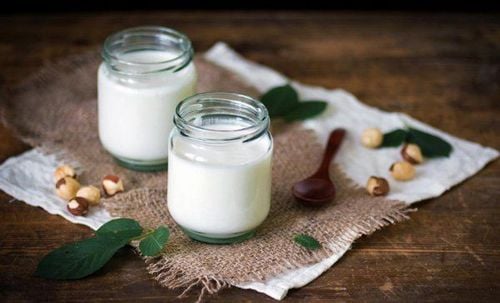This is an automatically translated article.
Article written by Master - Doctor Mai Vien Phuong - Head of Gastrointestinal Endoscopy Unit - Department of Medical Examination and Internal Medicine - Vinmec Central Park International General Hospital.
Mint has been used for hundreds of years as an herbal remedy for a variety of problems. It is considered a lifesaver for everything from colds and headaches to digestive problems. Science has also proven mint to be effective in treating irritable bowel syndrome (IBS). Some studies suggest that peppermint can reduce symptoms of IBS such as pain, constipation, bloating, and more. In fact, some studies suggest it may be more effective than fiber and less best as antispasmodics (muscle relaxants).
1. Peppermint Can Help Relieve IBS Symptoms
Peppermint Oil (PO) (Mentha Piperita) is a natural killing herb containing monoterpene compounds that target the pathophysiology of IBS. PO contains L-menthol, which blocks calcium channels in smooth muscle, thereby, producing an antispasmodic effect on the gastrointestinal tract. Translational studies have found that peppermint oil has an effect on the function of the esophagus, stomach, small intestine, gallbladder, and colon. Peppermint oil has antibacterial, anti-inflammatory, antioxidant, immunomodulatory, and anesthetic activities, all of which may be implicated in the treatment of IBS.2. How can mint help treat IBS?
Researchers are still trying to figure out exactly how peppermint oil relieves IBS symptoms. The indications so far point to menthol, one of the ingredients found in mint, to have a cooling effect. That's why you can find it in many healthcare products that treat problems like chest congestion and muscle pain.
When you have IBS symptoms, the nerves in your colon become super sensitive. That is what causes pain in the intestines. The muscles in your colon also tend to overreact and cause more symptoms. It seems that menthol can paralyze pain receptors and relax the muscles in your colon. It's a perfect recipe for IBS relief.
Since 1998, peppermint oil has been suggested to be possibly helpful in treating IBS symptoms. Other studies since then have confirmed this claim. In 2014, researchers concluded in a meta-analysis that peppermint oil is a safe and effective short-term treatment for IBS. The most common minimal side effect is heartburn. However, the majority of peppermint oil has been well tolerated in the available trials.

3. The effect of probiotics in the treatment of IBS symptoms
In addition to natural herbs like mint, the use of probiotics as a potential treatment for IBS has also increased over the past decade. However, assessing the effectiveness of probiotics in the treatment of IBS is challenging for a number of reasons. First, there are countless types of probiotics, each with specific advantages over the others. Furthermore, the majority of studies examining probiotics in the treatment of IBS are small, single-center, and do not follow the strict end-to-end criteria set by the US FDA for approval of pharmacological therapies.
Probiotics are live microorganisms that have great therapeutic potential for gastrointestinal disease. They have been studied and used in many cases of digestive disorders. There is increasing evidence for their use in the treatment of ileocolitis, Clostridium difficile colitis, antibiotic-associated diarrhea, inflammatory bowel disease, and IBS. The emerging multifactorial pathophysiology of IBS may offer adjuvant therapeutic opportunities for probiotics.
Probiotics have beneficial effects on the intestinal mucosa through several proposed mechanisms, including inhibition of pathogenic bacteria growth and association, improvement of epithelial barrier function, and altered activity host immunity. Probiotics secrete short-chain fatty acids, a mechanism that leads to a decrease in pH and production of bactericidal proteins.
Butyric acid, a by-product of bacterial fiber fermentation, has been shown to nourish intestinal cells in the colon and enhance mucosal integrity. The DNA of probiotic organisms has also been shown to inhibit apoptosis (programmed cell death) of epithelial cells. In addition, probiotics can improve bowel dysfunction.
A study by Desbonnet and colleagues investigated the probiotic Bifidobacterium Infantis in rats subjected to chronic stress (a forced swimming test) for 14 days. The results showed a decrease in the levels of tumor necrosis factor alpha, interferon gamma and interleukin 6 after stimulation of peripheral blood monocytes. Plasma concentrations of tryptophan and kynurenic acid were also significantly increased in mice treated with B. Infantis compared with controls. B. Infantis may act as an antidepressant by increasing levels of tryptophan, a serotonergic precursor, and decreasing proinflammatory markers. This increased level of tryptophan may have the potential to reduce the depressive overlay and abnormal enteric nervous system effects in IBS.
A study by Guyonnet and colleagues evaluated 274 IBS patients with constipation and randomized them to a placebo or fermented yogurt (Activia) containing Bifidobacterium animalis for 6 weeks. In the treatment group, health-related quality of life discomfort scores as well as flatulence symptoms (both key endpoints) improved and there was an increase in bowel frequency in the patients. The patient has a bowel movement less than 3 times per week. This type of yogurt may have the benefit of promoting reduced bowel dysfunction of IBS and possibly shortening intestinal transit time.

Brenner and colleagues conducted a meta-analysis in 2009 including 16 randomized controlled trials to evaluate the efficacy, safety, and tolerability of probiotics in IBS patients. B. Infantis 35624 was the only probiotic that showed significant benefits in improving the composite symptom scores of IBS patients. Bifidobacterium may be useful in alleviating IBS symptoms either alone or in combination with other probiotics, although the available data are incomplete and better-designed trials are still needed. again.
In conclusion, the use of probiotics in the treatment of IBS is an essential area of research due to the importance of the gut microbiome in this condition. The studies to date both provide interesting observations and raise fundamental questions. Overall, there are many studies that are small, of short duration and have significant design flaws, but there is growing evidence that B. Infantis is becoming a pioneer in the treatment of IBS. If larger and better controlled studies are done, we may begin to have diverse options regarding different probiotic species and for the treatment of specific groups of IBS symptoms. .
Please follow the website: Vinmec.com regularly to update many other useful information.
Please dial HOTLINE for more information or register for an appointment HERE. Download MyVinmec app to make appointments faster and to manage your bookings easily.
References: nih.gov, journals.lww.com














